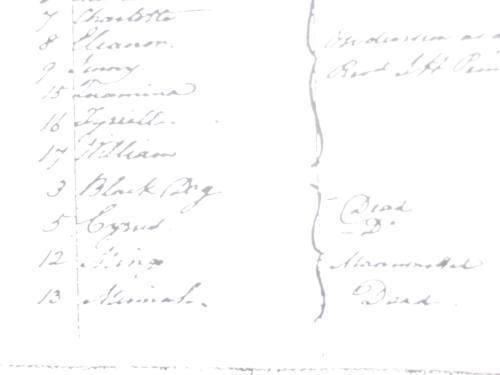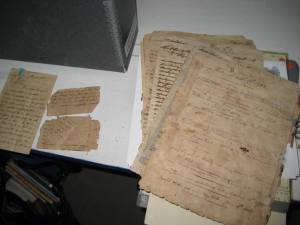touching history
Today I had breakfast with a feral cat. I was hoping a bananaquit would come and beg for sugar but instead a sleepy little stray came and begged for scraps. Since I was having pancakes I offered to pet him instead but he didn’t know what to do with himself—too giddy and skittish and hungry for attention. Finally he settled near my feet and dozed, and when I finished eating I got closer to try again; he was more settled but the poor thing was so desperate he ended up following me all the way back to my cabin, and when I closed the door he sat at the screen and yowled! I immediately washed my hands when I got inside since I’m allergic to cats, and then moments later felt so woozy I had to lie down. Was it the cat? I hate to blame the little guy but may have to avoid him for the rest of the week…
 I can’t write about everything but I want to get some things down in here. I started the day at the historical society; the ladies who work there remembered me and were very helpful, immediately finding the documents I needed. I started by examining the slave registers since I wanted to find out whether “Black Dog” lived into her 60s. She was 60 in the 1817 slave register for the Hermitage Estate but sadly didn’t survive up until the next survey taken in 1823. I still don’t know why she was named “Black Dog” but the owners of The Hermitage Plantation Inn have agreed to talk to me about the history of the place. There were only 17 enslaved people on that estate so I wonder if she was a domestic slave rather than a field laborer. Did she have children? A lover? The house on the site is from the 1740s, thought to be the oldest wood structure in the Antilles. Based on her age, she may have been brought (or born) there when the house was still quite new. Did I mention that her owner was a man of the cloth? Reverend Joseph Herbert Pemberton and his brother Walter. By 1823 it looks like Walter didn’t own any slaves—maybe he saw the light?
I can’t write about everything but I want to get some things down in here. I started the day at the historical society; the ladies who work there remembered me and were very helpful, immediately finding the documents I needed. I started by examining the slave registers since I wanted to find out whether “Black Dog” lived into her 60s. She was 60 in the 1817 slave register for the Hermitage Estate but sadly didn’t survive up until the next survey taken in 1823. I still don’t know why she was named “Black Dog” but the owners of The Hermitage Plantation Inn have agreed to talk to me about the history of the place. There were only 17 enslaved people on that estate so I wonder if she was a domestic slave rather than a field laborer. Did she have children? A lover? The house on the site is from the 1740s, thought to be the oldest wood structure in the Antilles. Based on her age, she may have been brought (or born) there when the house was still quite new. Did I mention that her owner was a man of the cloth? Reverend Joseph Herbert Pemberton and his brother Walter. By 1823 it looks like Walter didn’t own any slaves—maybe he saw the light?
 Next I asked for information on the Huggins case, and believe it or not, that story just gets worse. So the “insurrection” that took place on the Montravers Estate was caused by an accusation of theft—an enslaved man allegedly stole something from a free man of color. He was confronted by Huggins, confessed supposedly, and was whipped on the spot. Women who were related to the man being whipped started to cry (or “cry out,” depending on the witness) and in response, Huggins decided to give them something to really cry about. In response to the whipping of these women, the rest of the slaves decided to stage a work stoppage, it seems. And so Huggins had 32 of them publicly whipped. One enslaved woman was pregnant and cried out for mercy but none was shown. I found the Montravers register for 1817 and found some of the named slaves (Catherine, Castile, Range, Quashie, the two Jubas). I also found a plain white envelope that was filled with tattered letters addressed to Edward Huggins, Jr.! They didn’t relate to the case and were from the 1850s but it still felt amazing to sift through them. I felt like I needed to be wearing those white felt gloves…
Next I asked for information on the Huggins case, and believe it or not, that story just gets worse. So the “insurrection” that took place on the Montravers Estate was caused by an accusation of theft—an enslaved man allegedly stole something from a free man of color. He was confronted by Huggins, confessed supposedly, and was whipped on the spot. Women who were related to the man being whipped started to cry (or “cry out,” depending on the witness) and in response, Huggins decided to give them something to really cry about. In response to the whipping of these women, the rest of the slaves decided to stage a work stoppage, it seems. And so Huggins had 32 of them publicly whipped. One enslaved woman was pregnant and cried out for mercy but none was shown. I found the Montravers register for 1817 and found some of the named slaves (Catherine, Castile, Range, Quashie, the two Jubas). I also found a plain white envelope that was filled with tattered letters addressed to Edward Huggins, Jr.! They didn’t relate to the case and were from the 1850s but it still felt amazing to sift through them. I felt like I needed to be wearing those white felt gloves…
After the historical society I took the bus to my aunt’s house for a delicious bowl of soup. I also had a chance to test out my new video camera and boy, did my aunt have stories to tell! I learned things about my father that I never knew before, and more details about my grandmother’s short, mysterious life. Blackie, the funeral director here, is one of my cousins and apparently his mother Dovie may have information about Rosetta. So I need to find a way to meet them. Tomorrow I head to St. Kitts to meet Leonard Stapleton who is the person that told me about the Huggins case. He works at Brimstone Hill Fortress and is an expert on the island’s history so I’m looking forward to seeing his research. And while I’m there I’ll stop by the records office; hopefully they will have something on Rosetta’s medical history. The asylum in Antigua has no records from that era, but I found someone in the Registrar’s office who offered to do a search of the archives for a death certificate at least. I suppose there’s a remote chance that Rosetta is still alive, though she’d be nearing 100. Wherever she is, I hope she knows that people still speak her name. She was banished by not erased, not forgotten…





